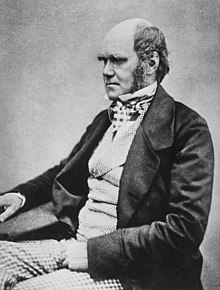Charles Darwin

Charles Darwin
Charles Darwin
FRS FRGS FLS FZS
| |
|---|---|

Darwin, c. 1854, when he was preparing On the Origin of Species for publication
| |
| Born |
Charles Robert Darwin
12 February 1809
The Mount, Shrewsbury, Shropshire, England
|
| Died | 19 April 1882 (aged 73)
Down House, Downe, Kent, England
|
| Known for | The Voyage of the Beagle On the Origin of Species The Descent of Man |
| Spouse(s) |
Emma Wedgwood (m. 1839)
|
| Children | 10 |
| Awards |
|
| Scientific career | |
| Fields | Natural history, geology |
| Institutions | Tertiary education: University of Edinburgh Medical School (medicine, no degree) Christ's College, CambridgeBachelor of Arts (1831) Master of Arts (1836) Professional institution: Geological Society of London |
| Academic advisors | John Stevens Henslow Adam Sedgwick |
| Influences | Charles Lyell Alexander von Humboldt John Herschel Thomas Malthus |
| Influenced | Hooker, Huxley, Romanes, Haeckel, Lubbock |
| Signature | |
 | |
Charles Robert Darwin, FRS FRGS FLS FZS (/ˈdɑːrwɪn/; 12 February 1809 – 19 April 1882) was an English naturalist, geologist and biologist, best known for his contributions to the science of evolution. His proposition that all species of life have descended over time from common ancestors is now widely accepted, and considered a foundational concept in science. In a joint publication with Alfred Russel Wallace, he introduced his scientific theory that this branching patternof evolution resulted from a process that he called natural selection, in which the struggle for existence has a similar effect to the artificial selection involved in selective breeding.[8]
Darwin published his theory of evolution with compelling evidence in his 1859 book On the Origin of Species, overcoming scientific rejection of earlier concepts of transmutation of species.[9][10] By the 1870s, the scientific community and a majority of the educated public had accepted evolution as a fact. However, many favoured competing explanations and it was not until the emergence of the modern evolutionary synthesis from the 1930s to the 1950s that a broad consensus developed in which natural selection was the basic mechanism of evolution. Darwin's scientific discovery is the unifying theory of the life sciences, explaining the diversity of life.
Darwin's early interest in nature led him to neglect his medical education at the University of Edinburgh; instead, he helped to investigate marine invertebrates. Studies at the University of Cambridge (Christ's College) encouraged his passion for natural science. His five-year voyage on HMS Beagle established him as an eminent geologist whose observations and theories supported Charles Lyell's uniformitarian ideas, and publication of his journal of the voyagemade him famous as a popular author.
Puzzled by the geographical distribution of wildlife and fossils he collected on the voyage, Darwin began detailed investigations, and in 1838 conceived his theory of natural selection. Although he discussed his ideas with several naturalists, he needed time for extensive research and his geological work had priority. He was writing up his theory in 1858 when Alfred Russel Wallace sent him an essay that described the same idea, prompting immediate joint publication of both of their theories. Darwin's work established evolutionary descent with modification as the dominant scientific explanation of diversification in nature. In 1871 he examined human evolution and sexual selection in The Descent of Man, and Selection in Relation to Sex, followed by The Expression of the Emotions in Man and Animals (1872). His research on plants was published in a series of books, and in his final book, The Formation of Vegetable Mould, through the Actions of Worms (1881), he examined earthworms and their effect on soil.
Darwin has been described as one of the most influential figures in human history, and he was honoured by burial in Westminster Abbey.
Darwin is a geologist and a British natural history scientist. He worked on the theory of evolution that earned him great fame.
The theory of evolution states that all living creatures descended from common ancestors and that the origin of man and the monkey is one.
Darwin worked on the development of his theory of natural selection, but did not publish it to realize the seriousness of the reactions to this development, which he did for his theory, but he later published for his knowledge of the work of another world on the theory similar to his theory.
Darwin is one of the most important and famous biologists, and has many books and works in this area, and the theory he developed has faced a flood of criticism, especially by clergy around the world.











0 Comments